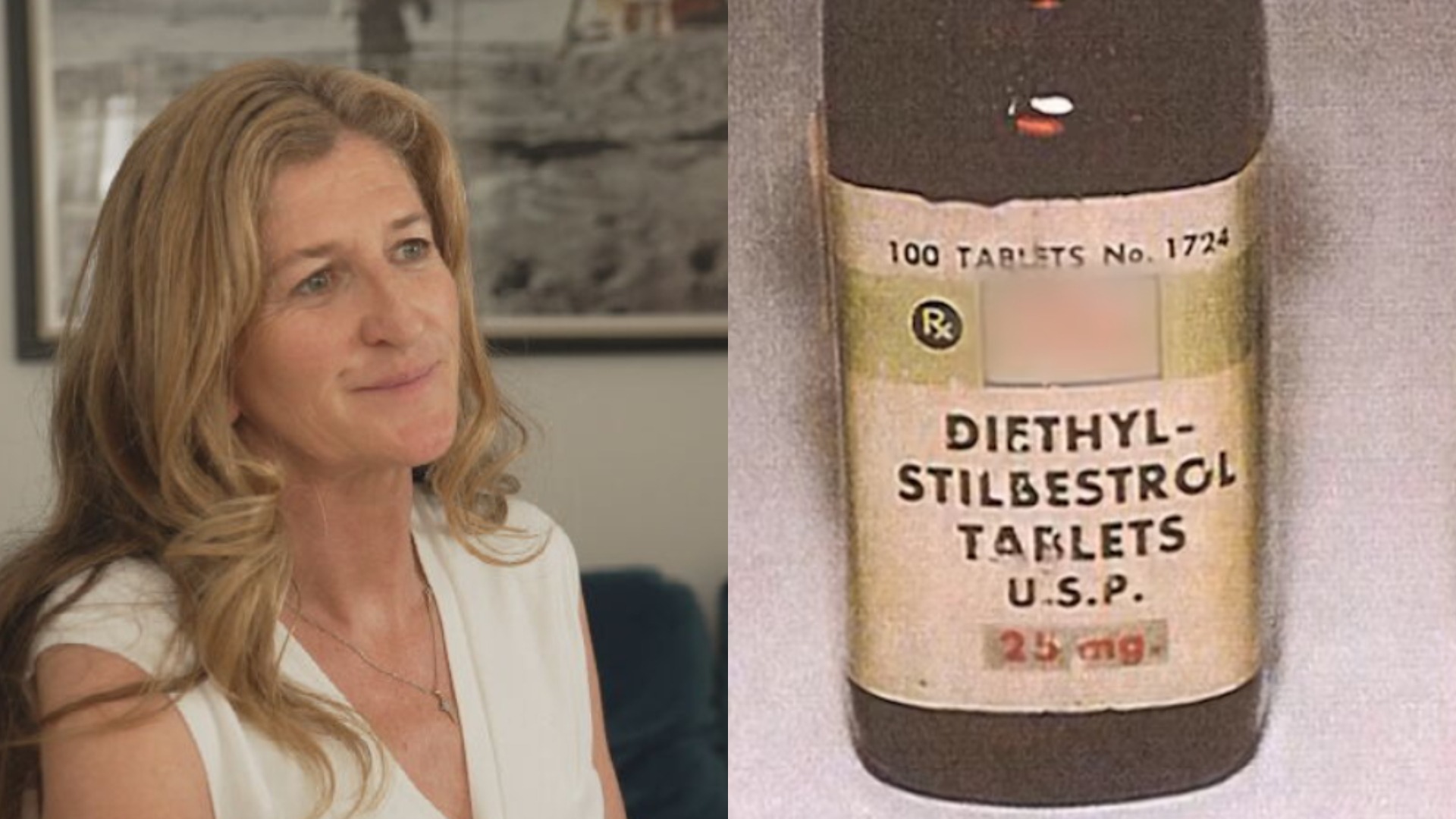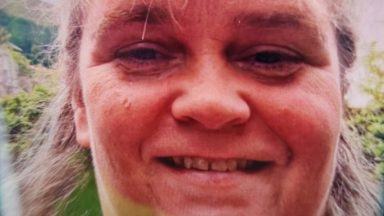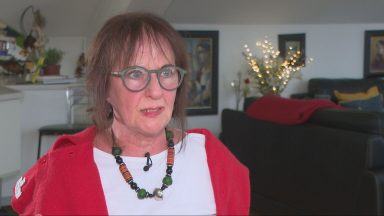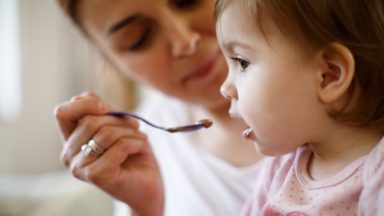MPs are urging the government to take action over a controversial pregnancy drug which has links to cancer, as ITV News Social Affairs Editor Sarah Corker reports
A group of more than 30 MPs has written a letter to the health secretary urging him to take action over a controversial drug given to pregnant women, following an ITV News investigation.
Stilbestrol, also known as DES, was prescribed to an estimated 300,000 women to prevent miscarriage and stop breast milk until the late 1970s, when it was linked to an aggressive type of cancer.
If the drug was taken by women who were pregnant, the harm could have been passed down to their children.
ITV News has been contacted by hundreds of women who say their health has been damaged by DES – and last week we revealed that it was still being prescribed to women on the NHS nearly a decade after it should have been banned.
Now MPs are calling on the government to take action and save lives.
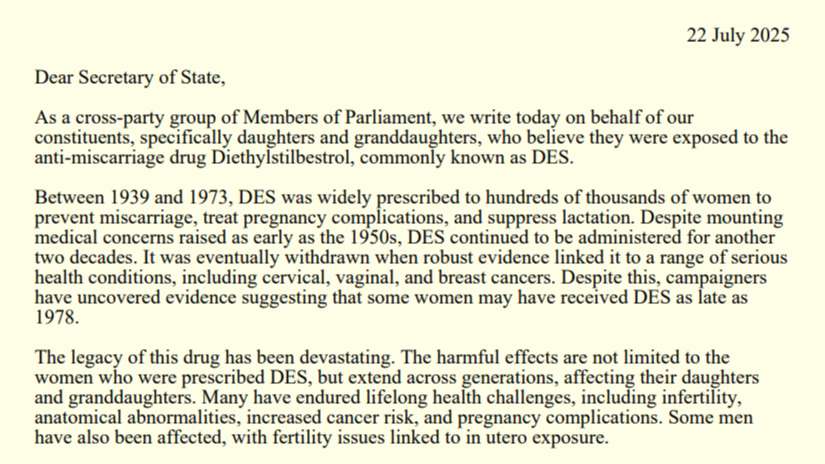
The letter, coordinated by Bournemouth MP Jessica Toale, urges Wes Streeting to formally apologise to victims of the medical scandal and to commit to enhanced cancer screenings for those exposed.
What are MPs calling for?
- A formal apology to the victims of DES, particularly for the prolonged use of the drug after credible evidence of harm had emerged
- A commitment to advancing research into the long-term and intergenerational effects of DES
- An information and training campaign across the NHS to ensure that healthcare professionals are aware of DES and its risks
- An assessment of the feasibility of tracking and notifying individuals who may have been exposed to DES in utero, given that many remain unaware of the drug or its consequences
- Implementation of targeted, advanced screening and monitoring for cancers and fertility complications associated with DES exposure
Jessica Toale wrote the letter after hearing her constituent Jan Hall’s story on ITV News.
Jan, 75, from Bournemouth, believes her mother Rita was prescribed DES during three pregnancies and that exposure contributed to her death, aged 32, from breast cancer in 1951, when Jan was a toddler.
“Frankly it’s shocking that we don’t know how many women and families have been affected by this, so we really need to do some work to raise awareness and to make sure we have the protocols in place to screen people.”
Jessica Toale MP explains why she is calling for action
The legacy of this drug has been devastating, with the harmful effects not limited to the women who were prescribed DES.
Medical research suggests it extends across generations, affecting their daughters who have an increased risk of rare types of cancer and fertility problems.
ITV News has spoken to one woman from Chichester who was exposed to the drug while her mother was pregnant and was forced to have a hysterectomy when she was just nine-years-old and nearly died from complications.
54-year-old Charly Laurence was just a child when she was diagnosed with cervical cancer.
Doctors said it was linked to the now banned drug that her mother had been given whilst pregnant. She’d had multiple miscarriages and was given DES for prolonged periods of time.
Charly first started developing symptoms when she was seven. Her mother took her to her original gynaecologist, who found the cancer after a number of invasive examinations.
Have you been impacted?
If you or anyone you know has been affected by this issue or has a story to share, get in touch
Over the next two years of Charly’s life, she was subjected to countless procedures and spent more time at hospital than she did at home.
“I remember them saying you are going to have an operation – unfortunately you won’t be able to have any babies, but you can adopt when you are older,” Charly told us.
“I certainly understood the concept of not being able to have a baby.
“I remember crying a lot as a child. They just kept reminding me that I was still alive and I wasn’t going to die of the cancer.”
She recently obtained her medical files, which show doctors in the UK were even writing to scientists in the US about her condition.
Charly Laurence is calling for more screening for women like her
Charly believes she is at a higher risk of developing certain types of cancer and her mission now is calling for more screening for women like her.
But despite everything, she has defied the odds and has gone on to have twin daughters, through surrogacy. Together, the family wants to raise awareness of the impact of DES and make sure others exposed to it get the right treatment.
What is DES?
DES, also known as Stilbrestrol, was prescribed on the NHS to prevent miscarriage and to stop breast milk production from 1939 until the late 1970s.
It was marketed as a ‘wonder drug’ and contained a synthetic form of female hormone oestrogen. It has become one of the biggest drug disasters in the NHS’s history.
The UK government claimed that doctors were told in 1973 to stop prescribing DES for pre-menopausal women, however ITV News has found dozens of women who were given the drug as late as 1980.
Other countries around the world, such as the United States, banned the drug in the 1970s as scientific studies linked the use of DES with breast, cervical, and vaginal cancers.
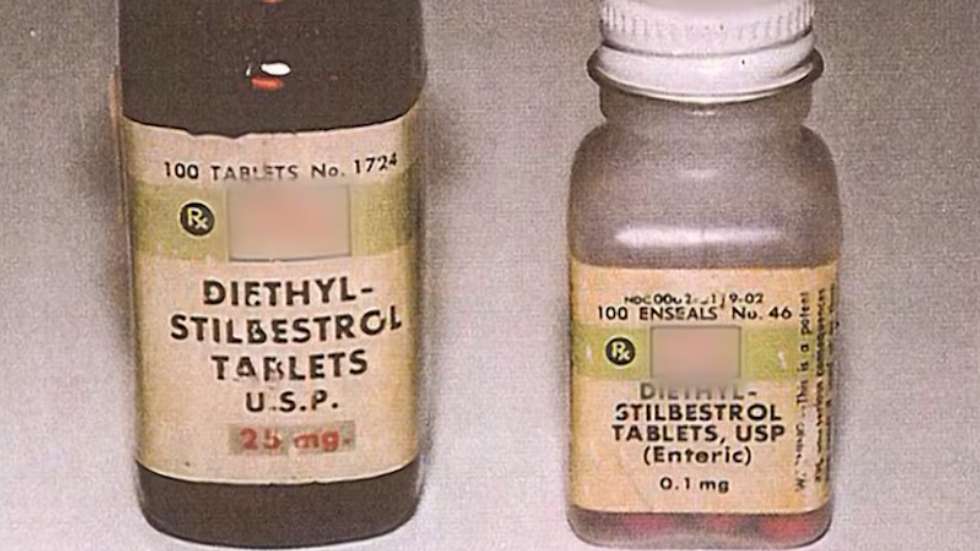
In the UK, health authorities failed to do the same.
Earlier this month, the Health Secretary said the government is considering enhanced cancer screening for those impacted by the use of Stilbestrol, also known as DES, and has vowed to “look seriously at these allegations”.
A Department of Health and Social Care spokesperson said: “Our sympathies are with anyone harmed by the historic use of Diethylstilboestrol (DES).
“The Secretary of State has been clear he will look seriously at these allegations, and the government will continue to consider enhanced screening for those impacted by the use of this drug.”
The Patient Safety Commissioner, Henrietta Hughes, has welcomed the Health Secretary’s views into the “medication scandal” and is calling for more support for those exposed to the drug during pregnancy.
“Like other medication scandals that have harmed women and their families, patients weren’t given the right information to make informed decisions about their healthcare.
“When safety concerns about medications are identified, these need to be swiftly communicated to prescribers and changes embedded in clinical practice.
“For those women and their daughters exposed to this drug during pregnancy it’s vital that they receive the right information and support so that they can be confident that any harm will be detected and treated quickly.”
Have you been impacted?
If you or anyone you know has been affected by this issue or has a story to share, get in touch
Follow STV News on WhatsApp
Scan the QR code on your mobile device for all the latest news from around the country


